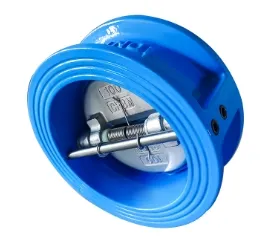
- Call Us
- +8618633052223
- njhdvlz@163.com
Jul . 25, 2025 10:10 Back to list
Upgrade Your Pipes with Premium Check Valves
When you need a valve that won't quit, the stainless check valve is your best bet. Made from high-grade stainless steel, these valves resist rust, corrosion, and extreme temperatures like champs. Whether you're dealing with salty seawater, harsh chemicals, or steam systems, a stainless check valve keeps working year after year without fail.
SS Check Valve: Industrial Strength for Demanding Jobs
Short for stainless steel, the SS check valve packs serious durability in a compact package. These valves are the top choice for food processing plants, pharmaceutical systems, and anywhere cleanliness matters. The smooth interior of an SS check valve prevents buildup and makes cleaning a breeze - no more worrying about contamination or clogged lines!
PTFE Check Valve: The Chemical Warrior
When you're working with nasty acids or solvents, ordinary valves just won't cut it. That's where the PTFE check valve comes in. With its super-resistant PTFE (Teflon) components, this valve laughs at corrosive chemicals that would destroy other valves. The PTFE check valve is the secret weapon for chemical plants, laboratories, and any system handling aggressive fluids.
PPR Check Valve: The Hot Water Specialist
For plumbing systems that handle hot water, the PPR check valve is the perfect match. Made from tough polypropylene random copolymer, these valves won't warp or weaken under heat. The PPR check valve is ideal for residential hot water systems, radiant floor heating, and industrial processes where plastic outperforms metal. Plus, they install quickly with simple heat fusion welding!
Choosing Your Perfect Check Valve Match
Picking the right valve doesn't have to be confusing! Need something tough? Go stainless check valve. Handling chemicals? PTFE check valve is your friend. Hot water systems? PPR check valve all the way. And when purity matters most, the SS check valve delivers. Whatever your needs, we've got the perfect check valve solution waiting for you.
SS Check Valve FAQs
How long does a stainless check valve last?
A quality stainless check valve can easily last 10+ years, even in harsh environments - that's why professionals love them!
What's the difference between SS check valve and regular stainless valves?
An SS check valve often uses higher-grade stainless (like 316L) and has polished interiors for ultra-clean applications like food processing.
Can PTFE check valves handle extreme temperatures?
While the PTFE check valve excels with chemicals, it typically works best between -50°F to 450°F (-45°C to 232°C) - check specs for your exact model.
Are PPR check valves good for drinking water?
Absolutely! The PPR check valve is non-toxic and commonly used in potable water systems worldwide.
Which check valve is easiest to install?
The PPR check valve wins for easiest installation with its simple heat fusion connection - no threading or special tools needed!
Why risk leaks, contamination, or early failures? Whether you need the rugged stainless check valve, ultra-clean SS check valve, chemical-proof PTFE check valve, or heat-resistant PPR check valve, we've got you covered.

-
Upgrade Your Pipes with Premium Check Valves
NewsJul.25,2025
-
The Smarter Way to Stop Backflow - Plastic & Rubber Check Valves
NewsJul.25,2025
-
Stop Backflow - Get Reliable Check Valves Today
NewsJul.25,2025
-
Reliable Flow Control: Choosing the Right Check Valve
NewsJul.25,2025
-
Get the Best Valves for Your Needs
NewsJul.25,2025
-
Premium Check Valves for Every Application
NewsJul.25,2025